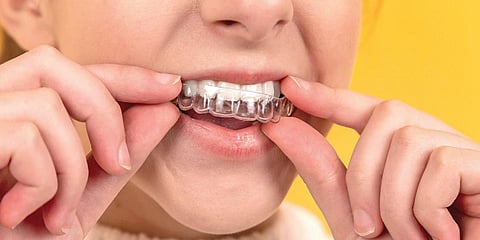

There is another pandemic in the making. But this one can be prevented. The oral health factsheet issued by the World Health Organisation indicates that more than 530 million children suffer from dental caries of primary teeth.
Dental caries or tooth decay in layman terms is the most common health condition, according to the Global Burden of Disease Index 2017. A significant lack of information on the subject and improper access to dental health care have led to an increase in children suffering from cavities, rotting, bacteria and loss of teeth at an early age.
A diet with high sugar and starchy food intake is the primary cause of dental caries. "It begins soon after birth. Prolonged night-time bottle feeding, honey or sweet pacifiers and on-demand breast feeding can lead to the first signs of gum decay in babies. The mother’s oral and general health also contribute as genetic factors," says Dr Brij Sabharwal, orthodontist and implantologist, and past president of the Indian Dental Association, Delhi.
Unfortunately, most parents ignore minor dental problems in their children’s teeth. As primary teeth eventually fall out, no serious value is assigned to their decay. This practice proves harmful in the long run, as children have primary teeth for at least six years - a long time to live with a rotten tooth.
Often, children are unable to express themselves or the exact cause of their pain, leading to further delay in appropriate treatment. Even the more enlightened and proactive parents are loath to seek treatment for their little ones, it being a time-consuming, painfully arduous and expensive procedure.
According to Dr Gargi Basu Kandhari, principal dentist at Dr Kandhari’s Skin and Dental Clinic Delhi, the food consumed these days is more processed and requires less chewing, leading to younger and younger children suffering from extensive caries and tooth decay.
Dr Punam Puri, a dental practitioner with an independent practice in Delhi, asserts that dental decay is the culmination of three factors sugary food, acid and bacteria in saliva. "Bacteria along with acid causes erosion of teeth and further damage occurs when food is left behind. Initially, one notices white spots, which represent the decalcification of the tooth surface. Later these spots turn yellow and brown and eventually dissolve the teeth. The worst part is that children may remain free from discomfort till it is too late," she says with concern.
Puri believes that dental caries is more prevalent in developed countries where fast and unhealthy food is easily available, being less prominent in developing nations. However, Dr Tanvi Ghonkrokta, dental practitioner based in New Zealand, thinks that the causative factors are largely socio-economic rather than country-specific.
She strongly believes that tooth decay in children and adults alike is a global phenomenon. High net-worth companies with vested interests continue to push for sales of high sugar foods, making the problem worse by the day. "The hidden sugars in our foods are often unaccounted for, whether in India or New Zealand, it's all the same," she says emphatically.
Significantly, New Zealand is one of the few countries in the world, to offer free universal dental care. This tends to overwhelm the system, preventing it from adequately addressing the problem of dental caries in children.
A link between dental decay and socio-economic status has been established in a definitive study on the subject of 'Epidemiology of Dental Pain and Dental Caries Among Children and Adolescents', published in the prestigious scientific platform Europe-PMC. Data collected by them shows that lower socio-economic groups suffer more because of reduced access to health care.
Interestingly, Ghonkrokta points out that dental issues are more prevalent in the indigenous Maori community of New Zealand. Belonging to a lower economic stratum, they prefer fast and unhealthy processed foods as a more affordable option.
On the other hand, the Pakeha New Zealanders of European descent, from more affluent backgrounds, make educated decisions on the consumption of food and take early action on dental issues. The problem may be of exponential proportions, but it is easily preventable through simple measures.
"In India, we do not emphasise the brushing of teeth enough, especially for children. This is detrimental to oral health," says Dr Kandhari, lauding the age-old twice-a-day teeth brushing routine, as the ideal solution to dental problems.
A healthy diet, regular dental check-ups and in more serious cases, application of a fluoride sealant are easy ways to nip the problem in the bud. "Children with braces/retainers need to be extra careful about tooth decay as debris and plaque tend to accumulate if the area is not cleaned properly. The right brushing techniques have to be followed, in addition to interdental cleaning aides," says Dr Ajay Raj Bhagat, Orthodontist and Dental Surgeon, Dentotal Clinic, Delhi
Tips to prevent dental caries in children
Night bottle feeds or snacks must be avoided after brushing. If necessary, the mouth should be rinsed with water before sleeping.
Brushing should be started in the first year of a child’s life with just a rice grain amount of paste used twice daily
Brushing should be done under the supervision of parents
Children who are prone to dental problems must visit the dentist every three months
For those with braces or retainers, modified strokes using orthodontic brushes should be demonstrated by the dentist